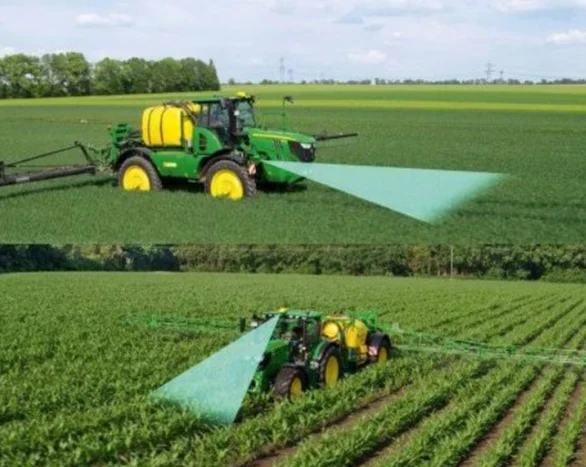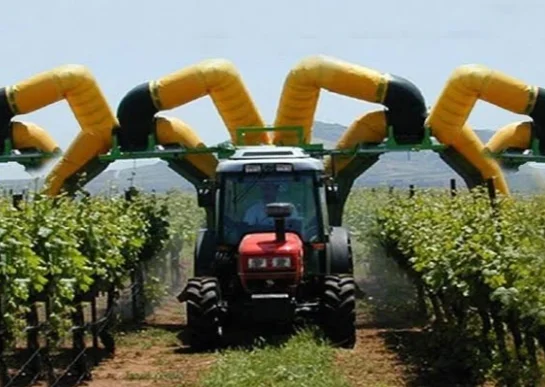Introduction Technology Company Leader in Modern Agriculture Field
The rise of technology companies in modern agriculture is both exciting and unsettling. Their innovations hold immense promise for increased efficiency, productivity, and environmental sustainability.
However, concerns remain about potential monopolization of resources, data privacy, and the impact on small-scale farmers and traditional agricultural practices.
The true leadership in this field lies not just in technological prowess, but in ensuring equitable access, ethical implementation, and a commitment to preserving the diversity and resilience of our food systems
Top 4 Technology Company in Modern Agriculture Field
Modern agriculture is experiencing a data-driven revolution, powered by brilliant minds harnessing the power of technology.
Here are Top 4 Technology Company in Modern Agriculture Field:
A Closer Look at the Top 4 Tech Titans in Modern Agriculture
To offer a more nuanced picture, let's delve deeper into each company and what sets them apart in the vibrant landscape of modern agriculture:
1. AgroSense:
Revolutionizing data-driven precision agriculture with AI and sensor technology. Optimizes resource use, boosts yields, and minimizes environmental impact.
- Secret Weapon: Their proprietary AI platform, "Terra," collects and analyzes data from soil sensors and weather stations, providing farmers with customized insights on irrigation, fertilization, and pest control.
- Impact: AgroSense has helped farmers reduce water usage by up to 30% and increase yields by 15%, contributing to environmental sustainability and improved food security.
2. RoboHarvest:
Tackling labor shortages and food waste with autonomous robots for efficient and sustainable fruit and vegetable harvests.
- Cutting-Edge Tech: Utilizing advanced AI and image recognition, their robots can identify and pick different types of fruits and vegetables with remarkable accuracy, minimizing damage and waste.
- Future Potential: RoboHarvest's robots are still in early stages, but their ability to address labor shortages and operate 24/7 holds immense promise for large-scale farms and labor-intensive crops.
3. GreenTech Labs:
Pioneering vertical farming as a solution for sustainable food production in urban areas, providing local access to fresh produce with minimal footprint.
- Urban Oasis: GreenTech's modular vertical farming systems allow for year-round food production in small spaces, ideal for urban environments and reducing transportation costs and emissions.
- Community Focus: They partner with local communities and schools to integrate vertical farming into education and empower communities to grow their own food, promoting both sustainability and food security.
4. CropIn:
Empowering farmers with a comprehensive suite of AI-powered digital tools for farm management, improving decision-making and profitability
- All-in-One Toolbox: CropIn's platform goes beyond precision agriculture, offering financial tools, market intelligence, and even weather forecasting, giving farmers a holistic view for profitable management decisions.
- Empowering Farmers: With tools in multiple languages and a focus on affordability, CropIn aims to democratize access to agricultural technology, especially for smallholder farmers in developing countries.
Each company boasts a unique approach and contributes significantly to the overall advancement of modern agriculture. The future of food systems is undoubtedly intertwined with the continued innovation and impact of these tech pioneers.
KPI For The Top 4 Technology Company in Modern Agriculture Field:
Here is KPIs for the Top 4 Tech Titans in Modern Agriculture:
1. AgroSense:
- Impact on yield: Increase in crop yield (%) measured before and after AgroSense implementation.
- Resource efficiency: Reduction in water usage (%) and fertilizer usage (%) attributed to AgroSense's data-driven recommendations.
- Environmental footprint: Carbon footprint reduction (tons CO2 equivalent) achieved through optimized resource management.
- Customer satisfaction: Net Promoter Score (NPS) of farmers using AgroSense platform.
2. RoboHarvest:
- Labor efficiency: Increase in harvest throughput (tons/hour) compared to traditional manual harvesting.
- Food waste reduction: Percentage reduction in post-harvest waste achieved through RoboHarvest's precision picking.
- Operational cost savings: Cost reduction per unit of harvest compared to traditional methods.
- Robot uptime and utilization: Percentage of time robots are operational and actively harvesting.
3. GreenTech Labs:
- Food production output: Tons of fresh produce grown per square meter per year within GreenTech's vertical farming systems.
- Water efficiency: Reduction in water usage per kg of produce compared to traditional agriculture.
- Local food access: Percentage of urban communities served with fresh, locally-grown produce from GreenTech farms.
- Community engagement: Number of educational programs and partnerships with local communities to promote vertical farming.
4. CropIn:
- Farmer adoption rate: Number of new farmers signing up for the CropIn platform per month.
- User engagement: Average time spent using the CropIn platform and number of features utilized by farmers.
- Increased profitability: Increase in farmer income (average or median) attributed to CropIn's decision-making tools.
- Reach and inclusivity: Number of smallholder farmers in developing countries using the CropIn platform.
Note: These are just examples, and the specific KPIs may vary depending on the company's unique goals and focus areas. Additionally, measuring the impact of these technologies can be complex and require carefully designed studies and data collection methods.
Conclusion Top 4 Technology Company in Modern Agriculture Field
The Future is Cultivated: A Conclusion on the Top 4 Tech Pioneers in Modern Agriculture
The vibrant landscape of modern agriculture is being reshaped by the pioneering spirit of technology companies pushing the boundaries of innovation.
While ranking these titans in a definitive "top 4" is inherently subjective, we can celebrate the diverse range of solutions they offer to the pressing challenges of our food systems.
From data-driven precision agriculture with AgroSense to the robotic workforce of RoboHarvest, the sustainable urban oasis of GreenTech Labs to the empowering tools of CropIn, each company offers a unique piece of the puzzle for a more secure and sustainable future.
Their impact can be measured in increased yields, reduced waste, empowered farmers, and thriving communities. But beyond metrics, it's the potential to transform how we grow, access, and experience food that truly sparks excitement.
The future of agriculture is no longer defined by backbreaking labor and unpredictable harvests. It's a future cultivated by data, robots, and a commitment to environmental stewardship. It's a future where food security and sustainability go hand-in-hand, and where communities have a stake in their own sustenance.
As these tech pioneers continue to innovate and collaborate, we can expect even more revolutionary solutions to emerge.
The road ahead may hold challenges, but one thing is certain: the seeds of a brighter future have been sown, and the harvest promises to be plentiful.
This is not just a conclusion, but an invitation to further exploration. Each company and technology holds countless stories of transformation and impact. Dive deeper, research, and discover the individuals and innovations shaping the future of our plates. Remember, this is not just about technology; it's about the people, the communities, and the very essence of how we nourish ourselves and the planet.
Thank you for exploring this exciting field with me. Let's continue to cultivate a future where technology and nature go hand-in-hand to feed a growing world, sustainably and equitably.
Frequently Asked Questions for Company Leaders in Modern Agriculture
Leadership and Strategy
1. What are the key challenges facing company leaders in modern agriculture?
- Climate Change: Adapting to changing weather patterns and extreme events.
- Sustainability: Balancing profitability with environmental responsibility.
- Technological Advancements: Keeping up with rapid technological changes.
- Consumer Trends: Understanding and meeting evolving consumer preferences.
- Global Competition: Competing in a highly competitive international market.
2. How can company leaders foster innovation and adaptability in their organizations?
- Encourage Experimentation: Create a culture that supports risk-taking and experimentation.
- Invest in Research and Development: Allocate resources to develop new technologies and products.
- Foster Collaboration: Collaborate with research institutions, startups, and other industry players.
- Embrace Digital Transformation: Leverage technology to improve efficiency and decision-making.
Sustainability and Environmental Responsibility
3. How can company leaders balance profitability with sustainability?
- Adopt Sustainable Practices: Implement environmentally friendly farming methods.
- Reduce Environmental Impact: Minimize water usage, pesticide use, and carbon emissions.
- Invest in Renewable Energy: Transition to renewable energy sources.
- Support Biodiversity: Protect and enhance biodiversity on agricultural lands.
4. What are the challenges and opportunities of sustainable agriculture?
- Challenges: Higher initial costs, potential yield reductions, and market acceptance.
- Opportunities: Increased consumer demand for sustainable products, government incentives, and improved technology.
Consumer Trends and Market Dynamics
5. How can company leaders respond to changing consumer preferences and market dynamics?
- Understand Consumer Needs: Conduct market research to identify consumer trends.
- Offer Diverse Products: Develop products that cater to different consumer segments.
- Prioritize Quality and Safety: Ensure high-quality and safe products.
- Build Trust: Foster relationships with consumers through transparency and ethical practices.
Global Competition and Trade
6. What are the challenges and opportunities of operating in a global agricultural market?
- Challenges: Trade barriers, currency fluctuations, and geopolitical risks.
- Opportunities: Access to larger markets, diverse inputs, and knowledge sharing.
7. How can company leaders mitigate the risks associated with global trade?
- Diversify Markets: Reduce dependence on a single market.
- Manage Currency Risk: Implement hedging strategies to protect against currency fluctuations.
- Build Strong Relationships: Establish relationships with international partners.
Technology and Innovation
8. How can company leaders leverage technology to improve agricultural productivity and efficiency?
- Invest in Digital Tools: Implement precision agriculture, IoT, and AI.
- Train Employees: Provide training on new technologies and digital skills.
- Collaborate with Tech Partners: Partner with technology companies to develop innovative solutions.
9. What are the challenges and opportunities associated with the adoption of new technologies in agriculture?
- Challenges: High initial costs, data privacy concerns, and infrastructure requirements.
- Opportunities: Improved efficiency, reduced costs, and increased sustainability.








